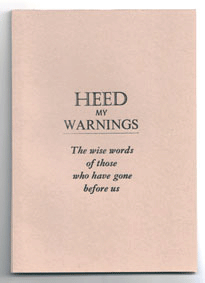Aphorisms revisited

A wonderful pamphlet by S.O.R.T design – The Society of Revisionist Typographers
I’ve been thinking about aphorisms again and why they are such wonderful things.
I’ve been thinking about aphorisms again and why they are such wonderful things.
It was partly because a planner called Mohammed Iqbal at O&M in Bangalore sent me a paper on the power of aphorisms or ‘wisdom literature’ as he calls them.Download file.
He talks about aphorisms as the world’s first information sharing network and ponders why we remember the wisdom encoded in aphorisms but find company intranets so useless.
And then I read David Ogilvy’s ‘Confessions of an advertising man’ in which the aphorisms that David created about this business are all on show from ‘if you pay peanuts you get monkeys’ to ‘why keep a dog and bark yourself?’
And then I came across ‘Heed my warnings’ a beautiful little pamphlet from S.O.R.T Design in Magma, which gives wise words edible typographic treatments including ‘zeal without knowledge is the sister of folly’ – a clear watch out for all of us who blog.
Now, as you know I am not sure about the the aphoristic form in advertising itself (though I recognise many of the brand lines that have endured have an aphoristic form) but rather in the business of advertising – helping to make the ideas we create more attractive and to promote our actions and advice.
Their power is that they deliver a truth or strong point of view in a form that is built for memorability and for repetition and transmission to others.
But having read Iqbal’s paper I realise they go deeper than this.
As humans we are pre-disposed to accept ideas presented in the aphoristic form as truth. Since they were the preliterate means of distributing wisdom (like the folly of eating the red berries or taking the seemingly quick view over the mountains) we invest them with moment, real meaning and truth.
So when Ogilvy says ‘we sell or else’ or S.O.R.T Design repeat wisdom like ‘a smooth sea never made a good mariner’ or Tony Blair says he will be ‘tough on crime and tough on the causes of crime’ we recognise the sense of the advice being given but we also respond to a form of communication that we are pre-disposed to believe.
Handy little things really.
Discover more from
Subscribe to get the latest posts sent to your email.

Aphorisms can certaining be very handy, particularly in removing the complexity of an issue or argument, leaving the recipient with a clear, understandable and memorable perspective.
But you could also argue that there an inherent danger in their use, because they lack the dynamic quality of debate and true engagement.
Modern politics contains very little debate; instead, aphorisms are commonly used to ‘sell’ policies to ‘consumers’, rather than engaging in meaningful conversation with citizens. As a result, complex issues such as crime are dumbed down to meaningless slogans. Maybe that’s one reason everyone is turned off by politics these days.
Aphorisms have their place in our language, but we shouldn’t fall into the trap of over- or mis-use, particularly in the business of advertising.
In the words of Russell Davies ‘What people actually want is stuff with some complexity…Not stuff that’s distlled to a simple essence or refined to a single compelling truth’.
I think to Ceri’s point successful (and true) aphorisms are packed full of meaning – think ‘just do it’ or even ‘tough on crime, tough on the causes of crime’ As Russell and Jeffre Jacskon have been talking about on their blogs recently they are examples of compression rather than reduction.
They do a great job at setting the table and starting discussion among people and with the brand/issue which is really all we can expect them to do.
There’s a great post on graham furlong’s blog that talks about John Maeda’s book ‘The Laws of Simplicity’ where he asks John about the simplicity/complexity debate. I think he has a pretty good point of view – simplicity is the attraction, but complexity is the lifetime relationship.
Love the idea that great aphorisms compress rather than reduce – like stock cubes.
I also love the idea about compression rather than reduction. Having just read this post i’ve just realised i’m using aphorisms at the moment for a pitch. Brilliant. Thank you.
Are aphorisms an answer to a communications paradox?
‘We want something that’s is simple and easy to use, but does all the complex and interesting things we might ever want it to do’
Yes, yes and more yes.
They alow us to represent the true complexity of the world (a la Russell D) in a form that is simple, elegant and accurate.
I also think that they make the idea more emotionlly ‘edible’ by using aliteration, rhyme, word play, substitution and the like.
exactly, ‘edible’ is a great way of putting it.
makes an idea easy to grasp, adopt, buy into and pass on to other people in a company, other stakeholders etc.
To further Gareth’s point, aphorisms are in fact more multi-faceted than they are given credit for. The best ones not only pack lots of information – they also encapsulate messages that actually seem mutually exclusive.
The following post at my blog elaborates on this chameleon-like ability.
http://blaiq.typepad.com/misentropy/2006/10/the_unsimplicit.html